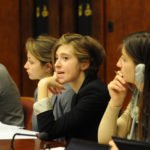The 4 Types of Passages You’ll See on ACT Reading
The ACT reading section requires students to answer 40 questions across four (or occasionally five) different passages in 35 minutes. To thoroughly test students’ abilities to not only read but also comprehend pieces of text, these passages are diverse in all respects, from style to structure to subject matter.
For the sake of consistency, however, the passages in ACT reading will always fall into the same four broad categories. In other words, each of the following categories comprise 25% of the ACT reading section, presented in the following order: prose fiction, social science, humanities, and natural science. Each category has its own distinguishing characteristics and presents its own unique challenges for students, as we explore in the sections below.
Prose Fiction
“The whistling of the tea kettle jarred me awake. While preparing the tea I hummed an old song. It was a tune that often came to me, but not the words…”
These passages are literary stories or narratives borrowed from various authors. They may include figurative language, literary devices, or strong emotions and tones. Some students may find it difficult to comprehend particularly convoluted writing styles or to determine the author’s intent behind a particular sentence structure.
Social Science
“A few years after America slipped into the Great Depression, a significant social experiment got under way…”
Often dealing with history, this category encompasses any significant human interactions, from broad sweeping histories of social movements to short biographies on particularly influential individuals. Questions in this category often test students’ ability to recall facts from the passage they just read, forcing more forgetful test-takers to spend extra time skimming back through the lines, trying to locate key pieces of information.
Humanities
“In any event, his time in Utrecht was the most fruitful of his career, when he produced some of his greatest images and a visual record of his activities…”
Passages in the humanities often express some author’s views on a particular subject. Many times, they are personal and written from a first-person point of view. Students are often asked to examine the author’s viewpoints, which not only means interpreting their opinions but also recognizing their assumptions and evaluating the extent of the author’s knowledge.
Natural Science
“There are 27 species of Pritchardia, 23 of which are found in Hawaii. Eight are officially classified as endangered, but Wood is convinced others as well face the threat of extinction…”
Objective and somewhat technical at times, these passages center around scientific topics. Similar to social science, most questions test students’ abilities to recall facts from the passage; however, as an additional challenge, the impersonal tone and scientific terminology can be denser and difficult to read.
While these descriptions emphasize the slight differences between categories, the types of questions that appear on the ACT are roughly the same across all reading passages; for example, students may still be expected to recall facts from prose fiction. However, knowing the types of questions that are more likely to appear in each category can also show students what to expect and where they are more likely to lose points.
Want to know how your ACT score impacts your chances of acceptance to your dream schools? Our free Chancing Engine will not only help you predict your odds, but also let you know how you stack up against other applicants, and which aspects of your profile to improve. Sign up for your free CollegeVine account today to gain access to our Chancing Engine and get a jumpstart on your college strategy!

